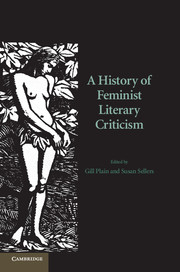Book contents
- Frontmatter
- Contents
- Acknowledgements
- Notes on contributors
- Introduction
- PART I PIONEERS AND PROTOFEMINISM
- PART II CREATING A FEMINIST LITERARY CRITICISM
- PART III POSTSTRUCTURALISM AND BEYOND
- Introduction to Part III
- 12 Feminist criticism and poststructuralism
- 13 Feminist criticism and psychoanalysis
- 14 French feminist criticism and writing the body
- 15 Postcolonial feminist criticism
- 16 Feminist criticism and queer theory
- 17 Feminist criticism and technologies of the body
- Postscript: flaming feminism?
- Index
- References
15 - Postcolonial feminist criticism
Published online by Cambridge University Press: 05 June 2012
- Frontmatter
- Contents
- Acknowledgements
- Notes on contributors
- Introduction
- PART I PIONEERS AND PROTOFEMINISM
- PART II CREATING A FEMINIST LITERARY CRITICISM
- PART III POSTSTRUCTURALISM AND BEYOND
- Introduction to Part III
- 12 Feminist criticism and poststructuralism
- 13 Feminist criticism and psychoanalysis
- 14 French feminist criticism and writing the body
- 15 Postcolonial feminist criticism
- 16 Feminist criticism and queer theory
- 17 Feminist criticism and technologies of the body
- Postscript: flaming feminism?
- Index
- References
Summary
In its formative years – the late 1960s and 1970s – second-wave feminist criticism in the West had two main aims. The first was to analyse literature as vehicle for reproducing and contesting patriarchal images of women in fictional texts. The second was to identify and analyse the specificity of women's writing. It set out to recover the lost history of women's writing and to identify both a difference of view in women's writing and a feminine aesthetic. By the 1980s, this process was increasingly being questioned by women critics who found both its underlying assumptions and the range of texts and traditions that it privileged narrow and exclusionary. The tendency to focus on the work of white, middle-class, Western, heterosexual women, often under a general heading of ‘women's writing’, had led to the silencing or marginalisation of issues of class, heterosexism, racism and the colonial legacy as they affected women's cultural production. Moreover, these absences in the important work of recovery that was being undertaken by feminist scholars and publishing houses were beginning to produce new, yet exclusionary, canons.
Even as these debates were being conducted within feminist literary and cultural studies, the increasing influence of poststructuralist, psychoanalytic and postcolonial theories was also making its mark. Such theories questioned the transparency of language, the fixity of meaning, claims to universalism and singular truth. They further problematised the Eurocentric gaze, the sovereignty of intentional subjectivity, authorship and untheorised appeals to global sisterhood and to women's experience.
- Type
- Chapter
- Information
- A History of Feminist Literary Criticism , pp. 282 - 300Publisher: Cambridge University PressPrint publication year: 2007
References
- 3
- Cited by

